Philosophy Essay: Examining John Locke's Tabula Rasa Theory
VerifiedAdded on 2020/05/11
|9
|1873
|122
Essay
AI Summary
This philosophy essay delves into John Locke's Tabula Rasa theory, contrasting it with the concept of innate principles championed by Socrates. The essay examines Locke's arguments in "An Essay Concerning Human Understanding," where he posits that the mind is a blank slate at birth, acquiring knowledge through experience, effectively rejecting the idea of pre-existing knowledge. It analyzes Locke's critique of innate ideas, including speculative and practical principles, and addresses counterarguments. The essay also touches upon the criticisms of Locke's theory, as well as a study by the National Academy of Sciences (PNAS). Ultimately, the essay argues in favor of Locke's theory, highlighting its strength and clarity in explaining knowledge acquisition through experience.

Running head: PHILOSOPHY
Philosophy
Name of the student
Name of the university
Author note
Philosophy
Name of the student
Name of the university
Author note
Paraphrase This Document
Need a fresh take? Get an instant paraphrase of this document with our AI Paraphraser
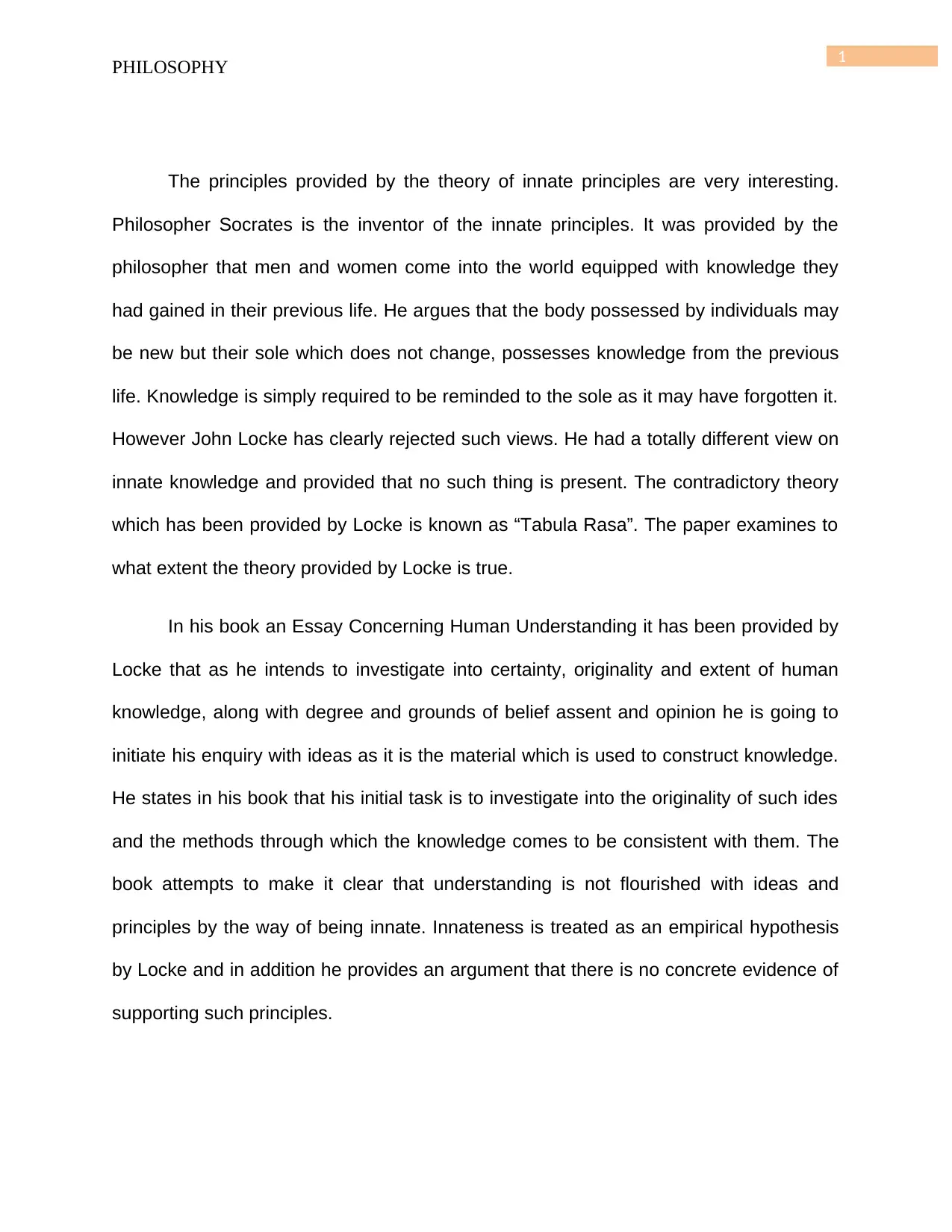
1
PHILOSOPHY
The principles provided by the theory of innate principles are very interesting.
Philosopher Socrates is the inventor of the innate principles. It was provided by the
philosopher that men and women come into the world equipped with knowledge they
had gained in their previous life. He argues that the body possessed by individuals may
be new but their sole which does not change, possesses knowledge from the previous
life. Knowledge is simply required to be reminded to the sole as it may have forgotten it.
However John Locke has clearly rejected such views. He had a totally different view on
innate knowledge and provided that no such thing is present. The contradictory theory
which has been provided by Locke is known as “Tabula Rasa”. The paper examines to
what extent the theory provided by Locke is true.
In his book an Essay Concerning Human Understanding it has been provided by
Locke that as he intends to investigate into certainty, originality and extent of human
knowledge, along with degree and grounds of belief assent and opinion he is going to
initiate his enquiry with ideas as it is the material which is used to construct knowledge.
He states in his book that his initial task is to investigate into the originality of such ides
and the methods through which the knowledge comes to be consistent with them. The
book attempts to make it clear that understanding is not flourished with ideas and
principles by the way of being innate. Innateness is treated as an empirical hypothesis
by Locke and in addition he provides an argument that there is no concrete evidence of
supporting such principles.
PHILOSOPHY
The principles provided by the theory of innate principles are very interesting.
Philosopher Socrates is the inventor of the innate principles. It was provided by the
philosopher that men and women come into the world equipped with knowledge they
had gained in their previous life. He argues that the body possessed by individuals may
be new but their sole which does not change, possesses knowledge from the previous
life. Knowledge is simply required to be reminded to the sole as it may have forgotten it.
However John Locke has clearly rejected such views. He had a totally different view on
innate knowledge and provided that no such thing is present. The contradictory theory
which has been provided by Locke is known as “Tabula Rasa”. The paper examines to
what extent the theory provided by Locke is true.
In his book an Essay Concerning Human Understanding it has been provided by
Locke that as he intends to investigate into certainty, originality and extent of human
knowledge, along with degree and grounds of belief assent and opinion he is going to
initiate his enquiry with ideas as it is the material which is used to construct knowledge.
He states in his book that his initial task is to investigate into the originality of such ides
and the methods through which the knowledge comes to be consistent with them. The
book attempts to make it clear that understanding is not flourished with ideas and
principles by the way of being innate. Innateness is treated as an empirical hypothesis
by Locke and in addition he provides an argument that there is no concrete evidence of
supporting such principles.
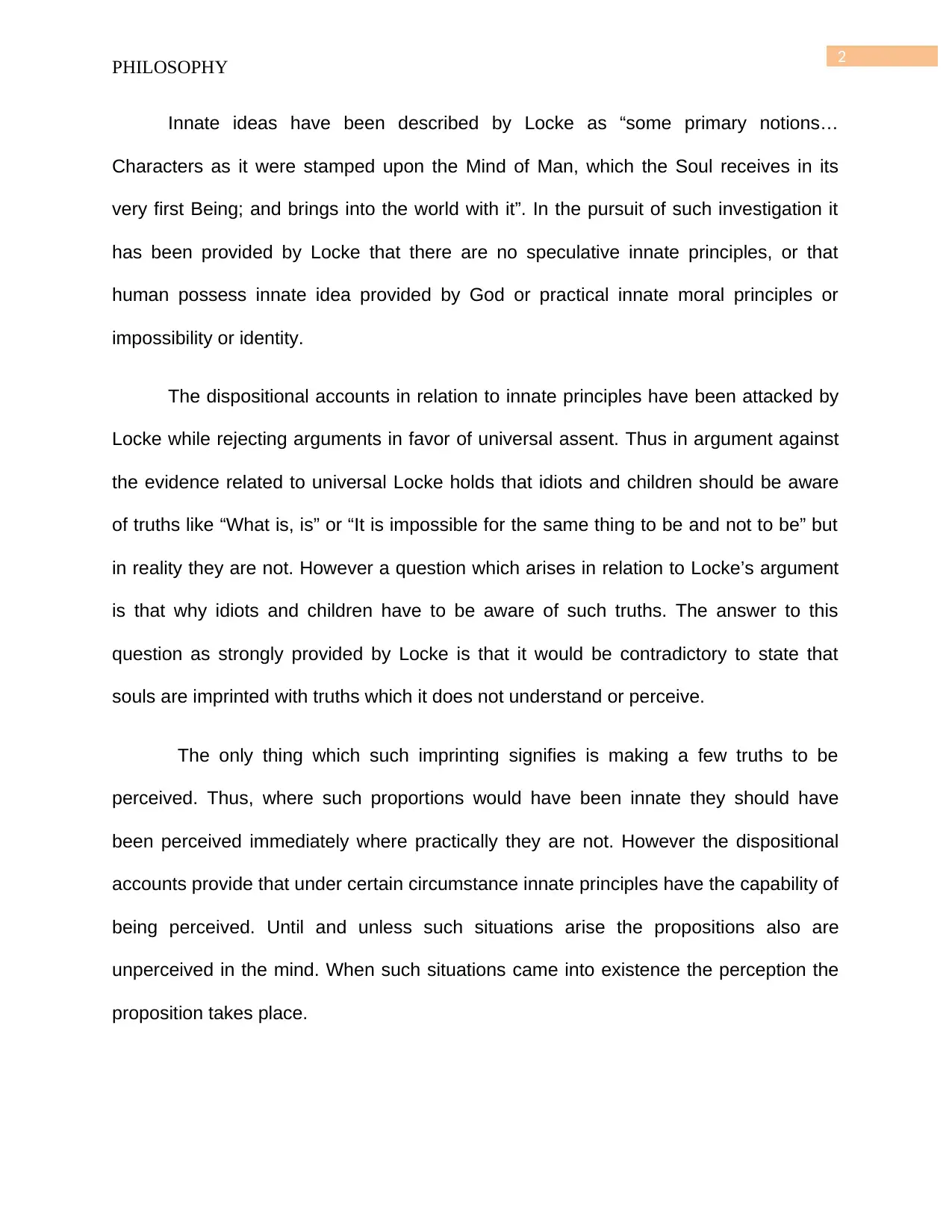
2
PHILOSOPHY
Innate ideas have been described by Locke as “some primary notions…
Characters as it were stamped upon the Mind of Man, which the Soul receives in its
very first Being; and brings into the world with it”. In the pursuit of such investigation it
has been provided by Locke that there are no speculative innate principles, or that
human possess innate idea provided by God or practical innate moral principles or
impossibility or identity.
The dispositional accounts in relation to innate principles have been attacked by
Locke while rejecting arguments in favor of universal assent. Thus in argument against
the evidence related to universal Locke holds that idiots and children should be aware
of truths like “What is, is” or “It is impossible for the same thing to be and not to be” but
in reality they are not. However a question which arises in relation to Locke’s argument
is that why idiots and children have to be aware of such truths. The answer to this
question as strongly provided by Locke is that it would be contradictory to state that
souls are imprinted with truths which it does not understand or perceive.
The only thing which such imprinting signifies is making a few truths to be
perceived. Thus, where such proportions would have been innate they should have
been perceived immediately where practically they are not. However the dispositional
accounts provide that under certain circumstance innate principles have the capability of
being perceived. Until and unless such situations arise the propositions also are
unperceived in the mind. When such situations came into existence the perception the
proposition takes place.
PHILOSOPHY
Innate ideas have been described by Locke as “some primary notions…
Characters as it were stamped upon the Mind of Man, which the Soul receives in its
very first Being; and brings into the world with it”. In the pursuit of such investigation it
has been provided by Locke that there are no speculative innate principles, or that
human possess innate idea provided by God or practical innate moral principles or
impossibility or identity.
The dispositional accounts in relation to innate principles have been attacked by
Locke while rejecting arguments in favor of universal assent. Thus in argument against
the evidence related to universal Locke holds that idiots and children should be aware
of truths like “What is, is” or “It is impossible for the same thing to be and not to be” but
in reality they are not. However a question which arises in relation to Locke’s argument
is that why idiots and children have to be aware of such truths. The answer to this
question as strongly provided by Locke is that it would be contradictory to state that
souls are imprinted with truths which it does not understand or perceive.
The only thing which such imprinting signifies is making a few truths to be
perceived. Thus, where such proportions would have been innate they should have
been perceived immediately where practically they are not. However the dispositional
accounts provide that under certain circumstance innate principles have the capability of
being perceived. Until and unless such situations arise the propositions also are
unperceived in the mind. When such situations came into existence the perception the
proposition takes place.
⊘ This is a preview!⊘
Do you want full access?
Subscribe today to unlock all pages.

Trusted by 1+ million students worldwide
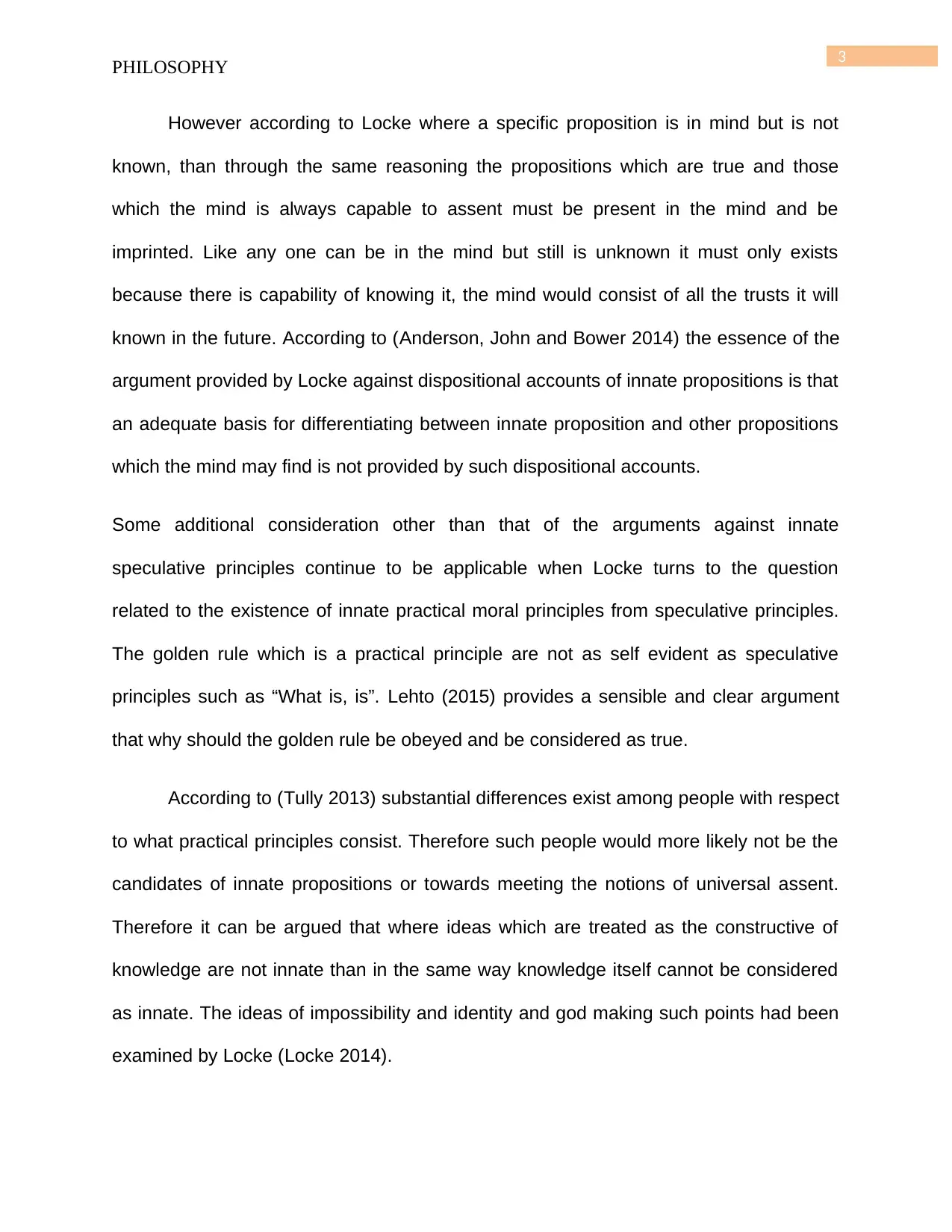
3
PHILOSOPHY
However according to Locke where a specific proposition is in mind but is not
known, than through the same reasoning the propositions which are true and those
which the mind is always capable to assent must be present in the mind and be
imprinted. Like any one can be in the mind but still is unknown it must only exists
because there is capability of knowing it, the mind would consist of all the trusts it will
known in the future. According to (Anderson, John and Bower 2014) the essence of the
argument provided by Locke against dispositional accounts of innate propositions is that
an adequate basis for differentiating between innate proposition and other propositions
which the mind may find is not provided by such dispositional accounts.
Some additional consideration other than that of the arguments against innate
speculative principles continue to be applicable when Locke turns to the question
related to the existence of innate practical moral principles from speculative principles.
The golden rule which is a practical principle are not as self evident as speculative
principles such as “What is, is”. Lehto (2015) provides a sensible and clear argument
that why should the golden rule be obeyed and be considered as true.
According to (Tully 2013) substantial differences exist among people with respect
to what practical principles consist. Therefore such people would more likely not be the
candidates of innate propositions or towards meeting the notions of universal assent.
Therefore it can be argued that where ideas which are treated as the constructive of
knowledge are not innate than in the same way knowledge itself cannot be considered
as innate. The ideas of impossibility and identity and god making such points had been
examined by Locke (Locke 2014).
PHILOSOPHY
However according to Locke where a specific proposition is in mind but is not
known, than through the same reasoning the propositions which are true and those
which the mind is always capable to assent must be present in the mind and be
imprinted. Like any one can be in the mind but still is unknown it must only exists
because there is capability of knowing it, the mind would consist of all the trusts it will
known in the future. According to (Anderson, John and Bower 2014) the essence of the
argument provided by Locke against dispositional accounts of innate propositions is that
an adequate basis for differentiating between innate proposition and other propositions
which the mind may find is not provided by such dispositional accounts.
Some additional consideration other than that of the arguments against innate
speculative principles continue to be applicable when Locke turns to the question
related to the existence of innate practical moral principles from speculative principles.
The golden rule which is a practical principle are not as self evident as speculative
principles such as “What is, is”. Lehto (2015) provides a sensible and clear argument
that why should the golden rule be obeyed and be considered as true.
According to (Tully 2013) substantial differences exist among people with respect
to what practical principles consist. Therefore such people would more likely not be the
candidates of innate propositions or towards meeting the notions of universal assent.
Therefore it can be argued that where ideas which are treated as the constructive of
knowledge are not innate than in the same way knowledge itself cannot be considered
as innate. The ideas of impossibility and identity and god making such points had been
examined by Locke (Locke 2014).
Paraphrase This Document
Need a fresh take? Get an instant paraphrase of this document with our AI Paraphraser
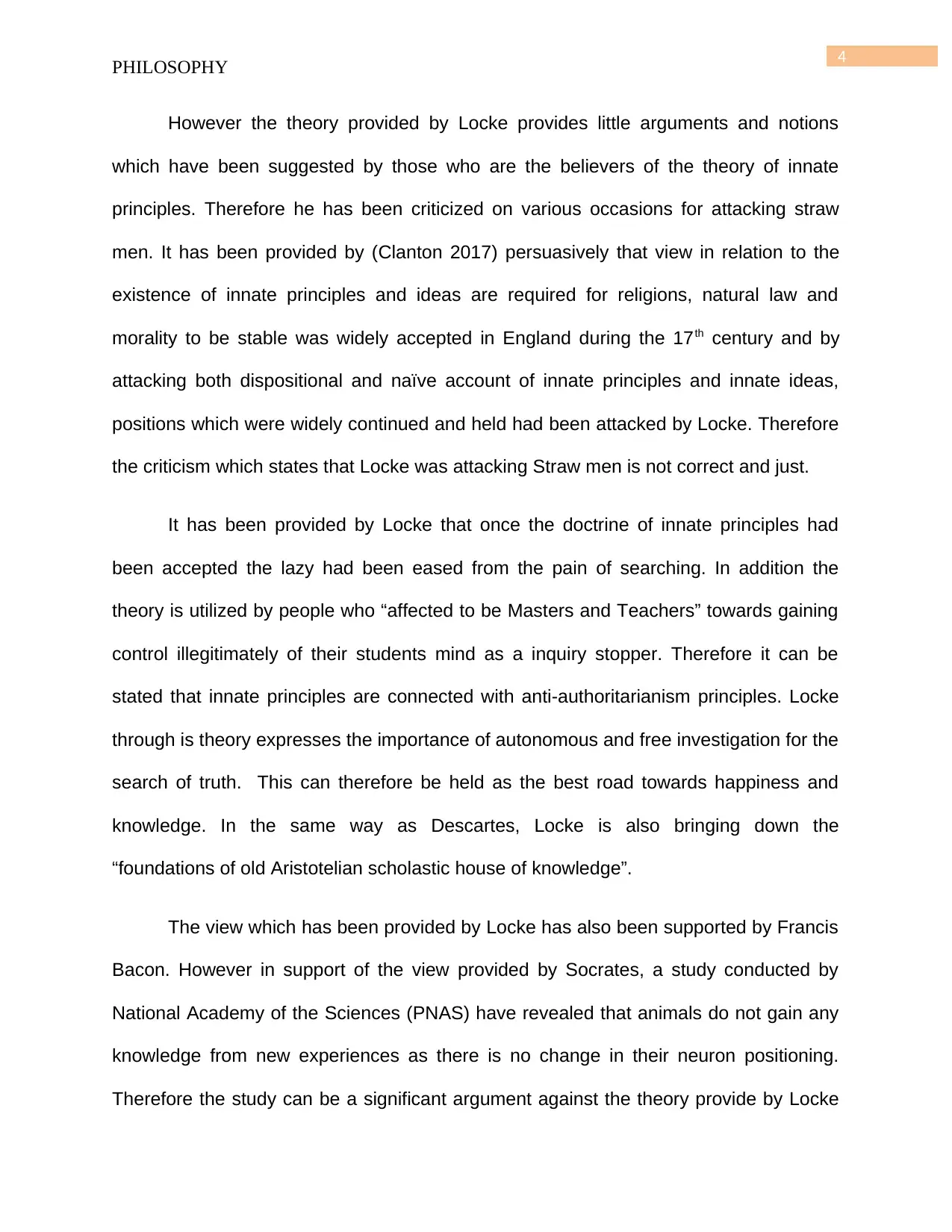
4
PHILOSOPHY
However the theory provided by Locke provides little arguments and notions
which have been suggested by those who are the believers of the theory of innate
principles. Therefore he has been criticized on various occasions for attacking straw
men. It has been provided by (Clanton 2017) persuasively that view in relation to the
existence of innate principles and ideas are required for religions, natural law and
morality to be stable was widely accepted in England during the 17th century and by
attacking both dispositional and naïve account of innate principles and innate ideas,
positions which were widely continued and held had been attacked by Locke. Therefore
the criticism which states that Locke was attacking Straw men is not correct and just.
It has been provided by Locke that once the doctrine of innate principles had
been accepted the lazy had been eased from the pain of searching. In addition the
theory is utilized by people who “affected to be Masters and Teachers” towards gaining
control illegitimately of their students mind as a inquiry stopper. Therefore it can be
stated that innate principles are connected with anti-authoritarianism principles. Locke
through is theory expresses the importance of autonomous and free investigation for the
search of truth. This can therefore be held as the best road towards happiness and
knowledge. In the same way as Descartes, Locke is also bringing down the
“foundations of old Aristotelian scholastic house of knowledge”.
The view which has been provided by Locke has also been supported by Francis
Bacon. However in support of the view provided by Socrates, a study conducted by
National Academy of the Sciences (PNAS) have revealed that animals do not gain any
knowledge from new experiences as there is no change in their neuron positioning.
Therefore the study can be a significant argument against the theory provide by Locke
PHILOSOPHY
However the theory provided by Locke provides little arguments and notions
which have been suggested by those who are the believers of the theory of innate
principles. Therefore he has been criticized on various occasions for attacking straw
men. It has been provided by (Clanton 2017) persuasively that view in relation to the
existence of innate principles and ideas are required for religions, natural law and
morality to be stable was widely accepted in England during the 17th century and by
attacking both dispositional and naïve account of innate principles and innate ideas,
positions which were widely continued and held had been attacked by Locke. Therefore
the criticism which states that Locke was attacking Straw men is not correct and just.
It has been provided by Locke that once the doctrine of innate principles had
been accepted the lazy had been eased from the pain of searching. In addition the
theory is utilized by people who “affected to be Masters and Teachers” towards gaining
control illegitimately of their students mind as a inquiry stopper. Therefore it can be
stated that innate principles are connected with anti-authoritarianism principles. Locke
through is theory expresses the importance of autonomous and free investigation for the
search of truth. This can therefore be held as the best road towards happiness and
knowledge. In the same way as Descartes, Locke is also bringing down the
“foundations of old Aristotelian scholastic house of knowledge”.
The view which has been provided by Locke has also been supported by Francis
Bacon. However in support of the view provided by Socrates, a study conducted by
National Academy of the Sciences (PNAS) have revealed that animals do not gain any
knowledge from new experiences as there is no change in their neuron positioning.
Therefore the study can be a significant argument against the theory provide by Locke
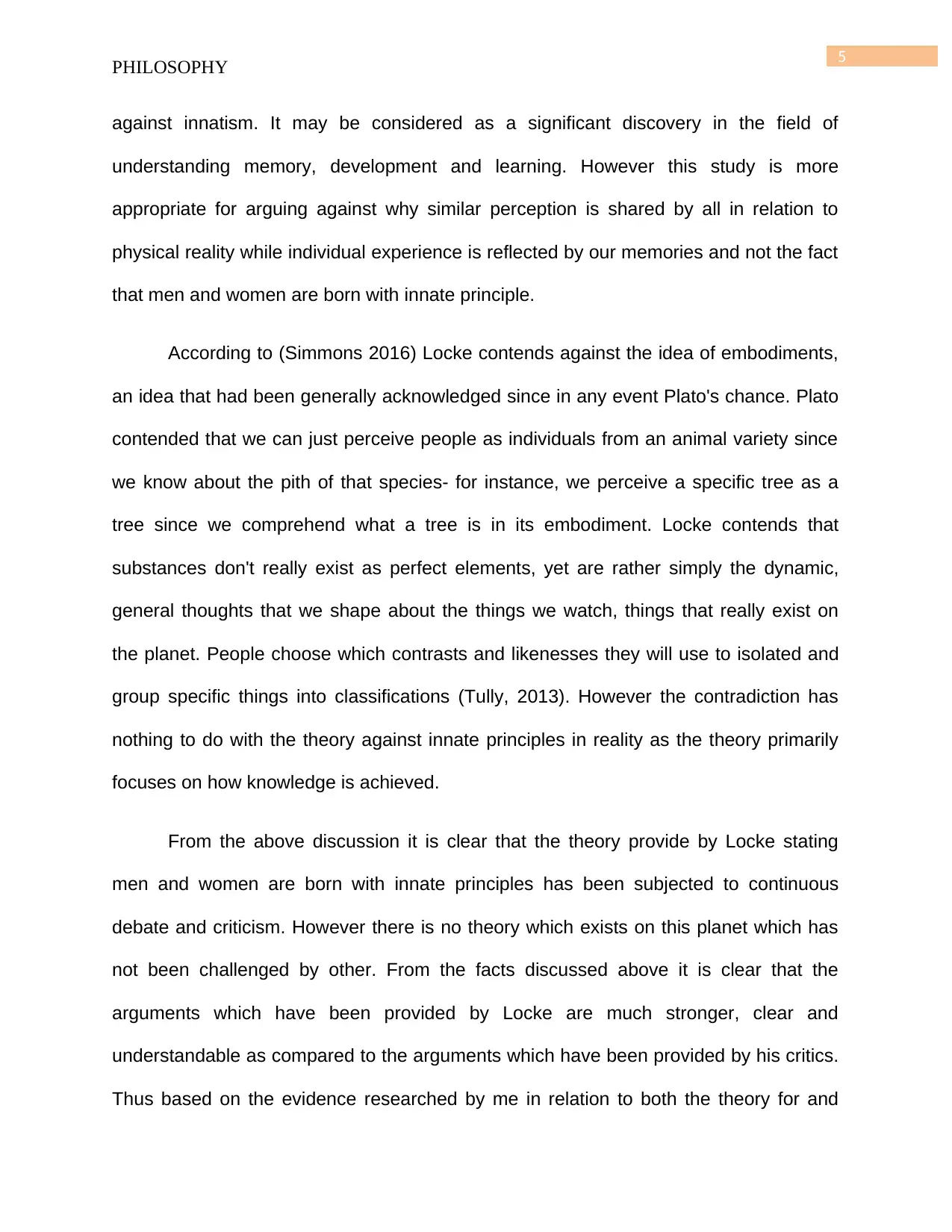
5
PHILOSOPHY
against innatism. It may be considered as a significant discovery in the field of
understanding memory, development and learning. However this study is more
appropriate for arguing against why similar perception is shared by all in relation to
physical reality while individual experience is reflected by our memories and not the fact
that men and women are born with innate principle.
According to (Simmons 2016) Locke contends against the idea of embodiments,
an idea that had been generally acknowledged since in any event Plato's chance. Plato
contended that we can just perceive people as individuals from an animal variety since
we know about the pith of that species- for instance, we perceive a specific tree as a
tree since we comprehend what a tree is in its embodiment. Locke contends that
substances don't really exist as perfect elements, yet are rather simply the dynamic,
general thoughts that we shape about the things we watch, things that really exist on
the planet. People choose which contrasts and likenesses they will use to isolated and
group specific things into classifications (Tully, 2013). However the contradiction has
nothing to do with the theory against innate principles in reality as the theory primarily
focuses on how knowledge is achieved.
From the above discussion it is clear that the theory provide by Locke stating
men and women are born with innate principles has been subjected to continuous
debate and criticism. However there is no theory which exists on this planet which has
not been challenged by other. From the facts discussed above it is clear that the
arguments which have been provided by Locke are much stronger, clear and
understandable as compared to the arguments which have been provided by his critics.
Thus based on the evidence researched by me in relation to both the theory for and
PHILOSOPHY
against innatism. It may be considered as a significant discovery in the field of
understanding memory, development and learning. However this study is more
appropriate for arguing against why similar perception is shared by all in relation to
physical reality while individual experience is reflected by our memories and not the fact
that men and women are born with innate principle.
According to (Simmons 2016) Locke contends against the idea of embodiments,
an idea that had been generally acknowledged since in any event Plato's chance. Plato
contended that we can just perceive people as individuals from an animal variety since
we know about the pith of that species- for instance, we perceive a specific tree as a
tree since we comprehend what a tree is in its embodiment. Locke contends that
substances don't really exist as perfect elements, yet are rather simply the dynamic,
general thoughts that we shape about the things we watch, things that really exist on
the planet. People choose which contrasts and likenesses they will use to isolated and
group specific things into classifications (Tully, 2013). However the contradiction has
nothing to do with the theory against innate principles in reality as the theory primarily
focuses on how knowledge is achieved.
From the above discussion it is clear that the theory provide by Locke stating
men and women are born with innate principles has been subjected to continuous
debate and criticism. However there is no theory which exists on this planet which has
not been challenged by other. From the facts discussed above it is clear that the
arguments which have been provided by Locke are much stronger, clear and
understandable as compared to the arguments which have been provided by his critics.
Thus based on the evidence researched by me in relation to both the theory for and
⊘ This is a preview!⊘
Do you want full access?
Subscribe today to unlock all pages.

Trusted by 1+ million students worldwide
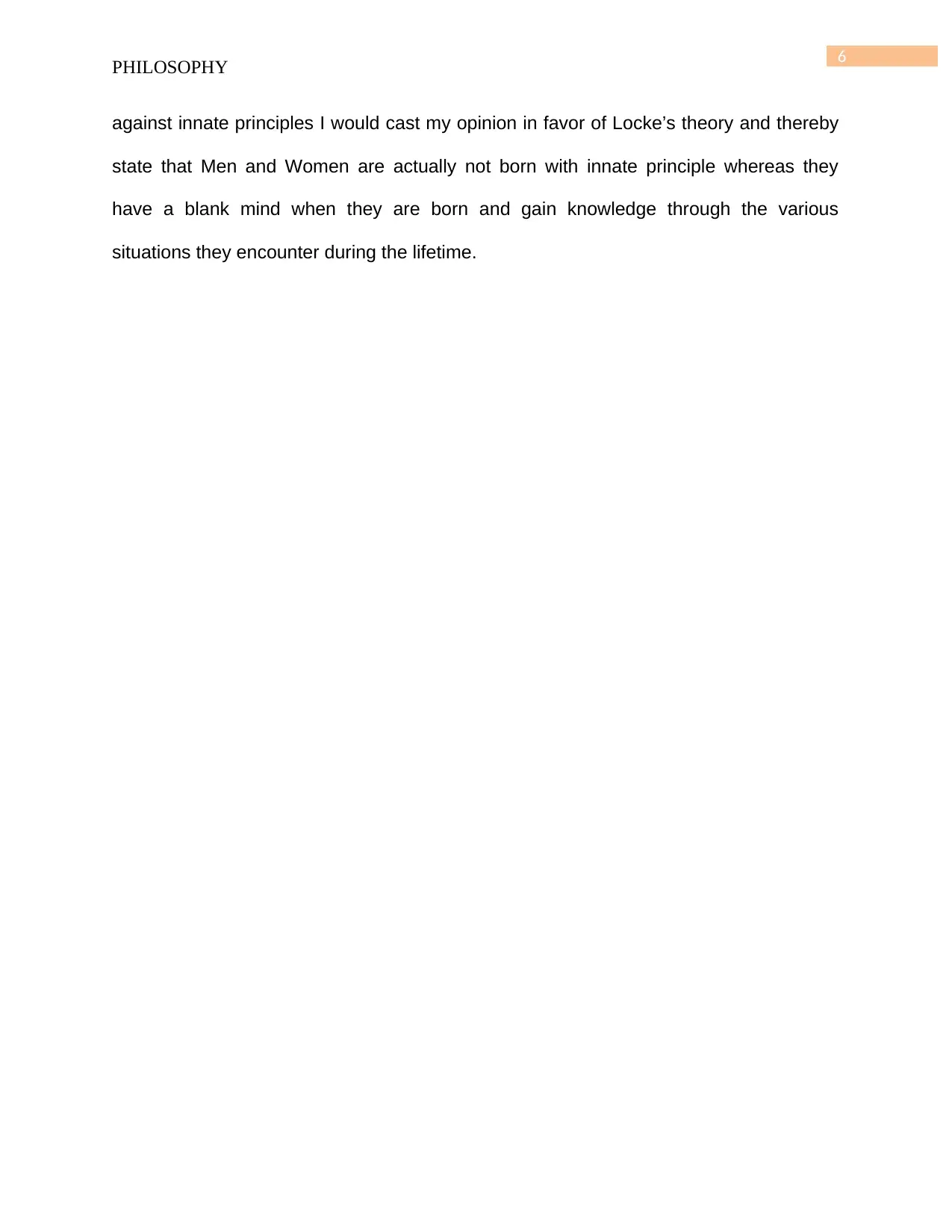
6
PHILOSOPHY
against innate principles I would cast my opinion in favor of Locke’s theory and thereby
state that Men and Women are actually not born with innate principle whereas they
have a blank mind when they are born and gain knowledge through the various
situations they encounter during the lifetime.
PHILOSOPHY
against innate principles I would cast my opinion in favor of Locke’s theory and thereby
state that Men and Women are actually not born with innate principle whereas they
have a blank mind when they are born and gain knowledge through the various
situations they encounter during the lifetime.
Paraphrase This Document
Need a fresh take? Get an instant paraphrase of this document with our AI Paraphraser
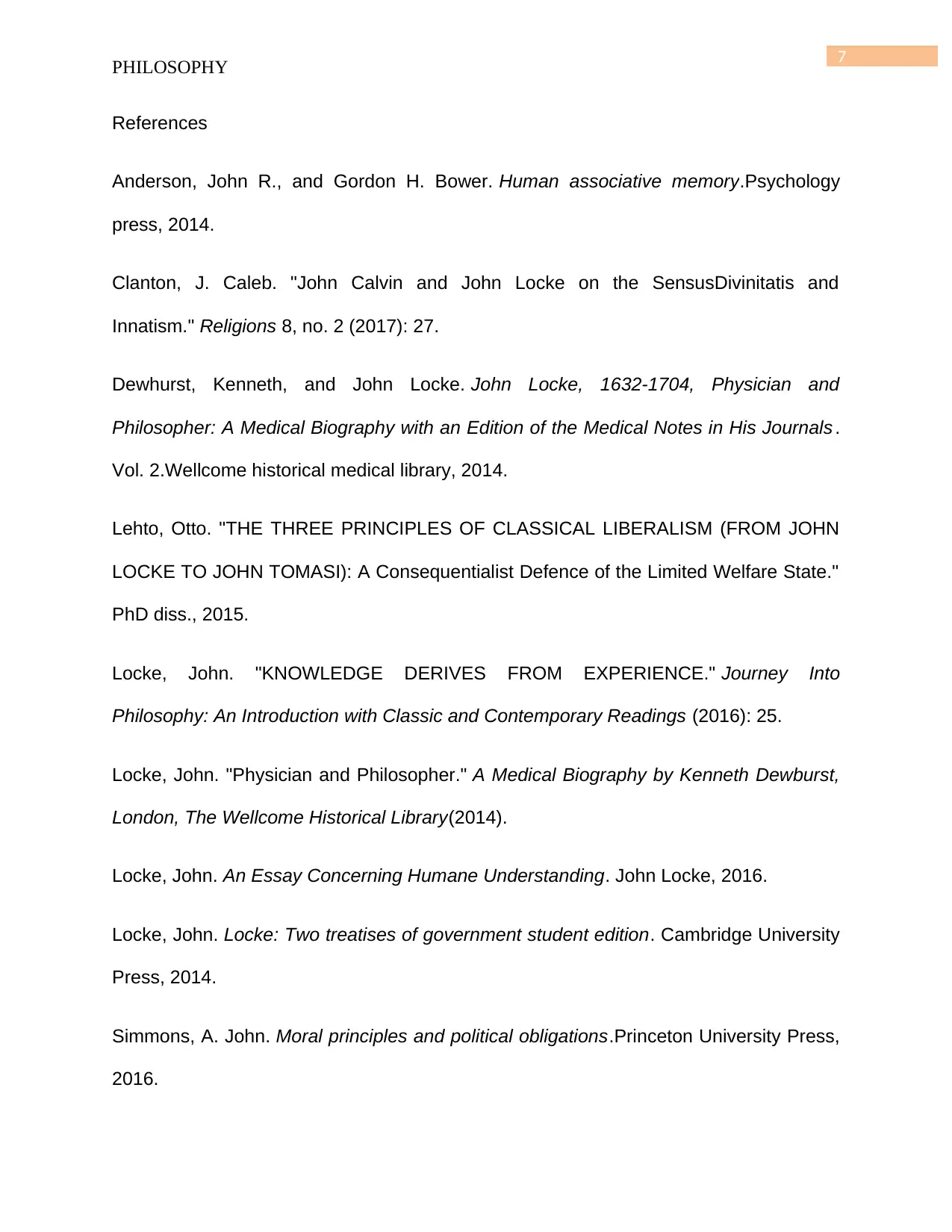
7
PHILOSOPHY
References
Anderson, John R., and Gordon H. Bower. Human associative memory.Psychology
press, 2014.
Clanton, J. Caleb. "John Calvin and John Locke on the SensusDivinitatis and
Innatism." Religions 8, no. 2 (2017): 27.
Dewhurst, Kenneth, and John Locke. John Locke, 1632-1704, Physician and
Philosopher: A Medical Biography with an Edition of the Medical Notes in His Journals .
Vol. 2.Wellcome historical medical library, 2014.
Lehto, Otto. "THE THREE PRINCIPLES OF CLASSICAL LIBERALISM (FROM JOHN
LOCKE TO JOHN TOMASI): A Consequentialist Defence of the Limited Welfare State."
PhD diss., 2015.
Locke, John. "KNOWLEDGE DERIVES FROM EXPERIENCE." Journey Into
Philosophy: An Introduction with Classic and Contemporary Readings (2016): 25.
Locke, John. "Physician and Philosopher." A Medical Biography by Kenneth Dewburst,
London, The Wellcome Historical Library(2014).
Locke, John. An Essay Concerning Humane Understanding. John Locke, 2016.
Locke, John. Locke: Two treatises of government student edition. Cambridge University
Press, 2014.
Simmons, A. John. Moral principles and political obligations.Princeton University Press,
2016.
PHILOSOPHY
References
Anderson, John R., and Gordon H. Bower. Human associative memory.Psychology
press, 2014.
Clanton, J. Caleb. "John Calvin and John Locke on the SensusDivinitatis and
Innatism." Religions 8, no. 2 (2017): 27.
Dewhurst, Kenneth, and John Locke. John Locke, 1632-1704, Physician and
Philosopher: A Medical Biography with an Edition of the Medical Notes in His Journals .
Vol. 2.Wellcome historical medical library, 2014.
Lehto, Otto. "THE THREE PRINCIPLES OF CLASSICAL LIBERALISM (FROM JOHN
LOCKE TO JOHN TOMASI): A Consequentialist Defence of the Limited Welfare State."
PhD diss., 2015.
Locke, John. "KNOWLEDGE DERIVES FROM EXPERIENCE." Journey Into
Philosophy: An Introduction with Classic and Contemporary Readings (2016): 25.
Locke, John. "Physician and Philosopher." A Medical Biography by Kenneth Dewburst,
London, The Wellcome Historical Library(2014).
Locke, John. An Essay Concerning Humane Understanding. John Locke, 2016.
Locke, John. Locke: Two treatises of government student edition. Cambridge University
Press, 2014.
Simmons, A. John. Moral principles and political obligations.Princeton University Press,
2016.
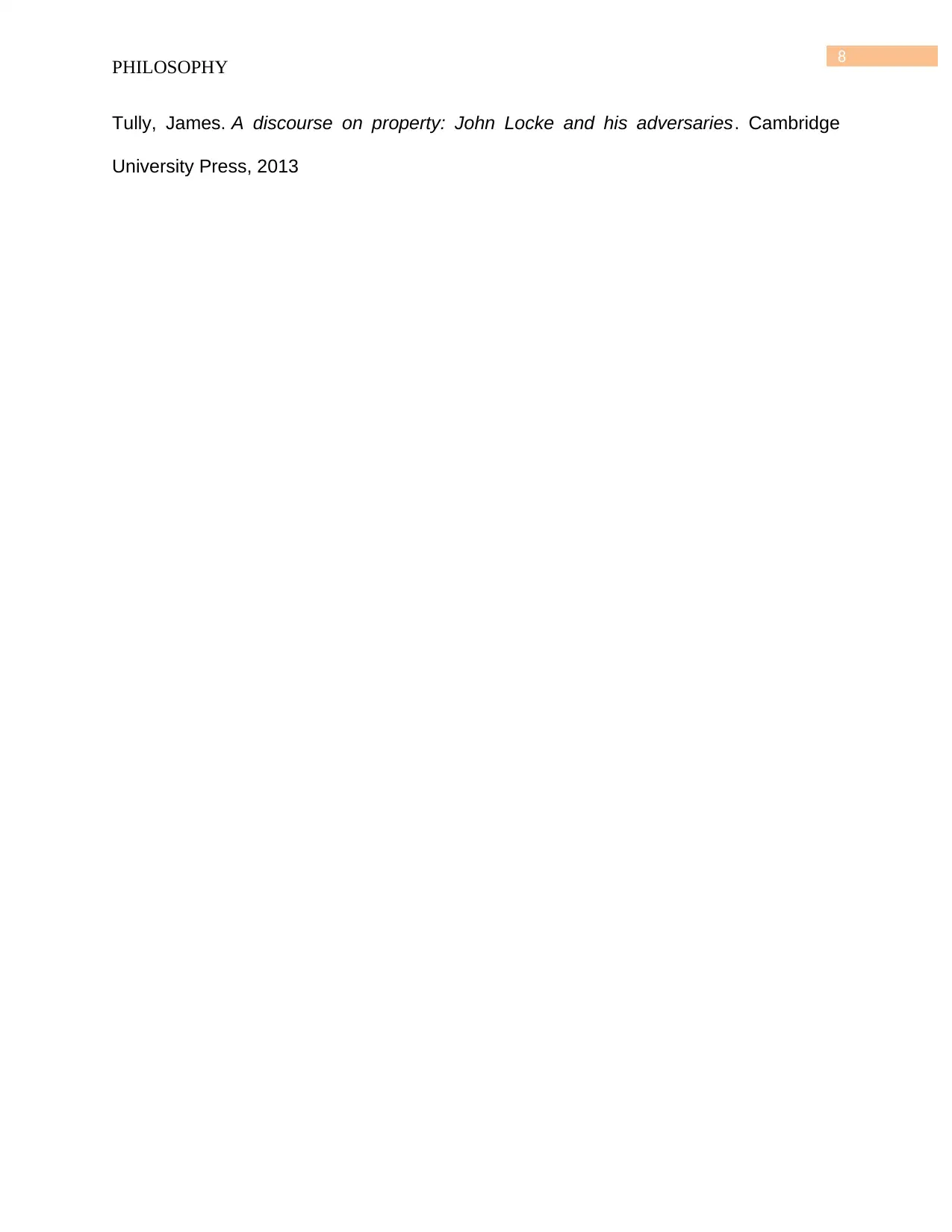
8
PHILOSOPHY
Tully, James. A discourse on property: John Locke and his adversaries. Cambridge
University Press, 2013
PHILOSOPHY
Tully, James. A discourse on property: John Locke and his adversaries. Cambridge
University Press, 2013
⊘ This is a preview!⊘
Do you want full access?
Subscribe today to unlock all pages.

Trusted by 1+ million students worldwide
1 out of 9
Your All-in-One AI-Powered Toolkit for Academic Success.
+13062052269
info@desklib.com
Available 24*7 on WhatsApp / Email
![[object Object]](/_next/static/media/star-bottom.7253800d.svg)
Unlock your academic potential
Copyright © 2020–2026 A2Z Services. All Rights Reserved. Developed and managed by ZUCOL.


